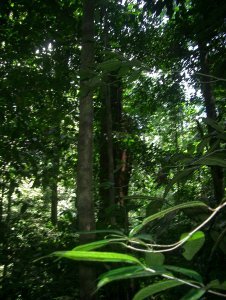Advertisement
Published: July 28th 2008

 Sarawak
Sarawak
The rainforest that everybody loves. asked local voices at the Rainforest World Music Festival.
Rainforest, longhouses, oil palms, logging: these are the story of the Trans-Borneo Highway in Sarawak.
A romantic notion of the longhouses has them all buried deep in the rainforest, with the communities leading a happy, subsistence lifestyle. In reality there are increasingly groups of longhouses close to the highway, sometimes within sight of each other. Here, as everywhere, people like being close to amenities and communications networks, and the government encourages people to take part in the modern economy. Is the Rainforest World Music Festival named for something a little outmoded?
What rainforest? Local protesters gathered outside the main gate one evening, not to protest the festival, but to cash in on the popularity of its name to worry about deforestation in Sarawak. They encouraged people to visit
Whatrainforest.com. I had leisure to contemplate their concerns as I drove the length of Sarawak.
According to a VCD this group puts out, only 2%!o(MISSING)f Sarawak remains virgin rainforest. One reality of driving this highway is passing heavily loaded timber trucks. The loggers claim they practice selective logging; yet acres and acres of land are cleared

 Sarawak
Sarawak
Jimmy inspects an oil palm plantation that has replaced the forest.for plantations of oil palms. Another reality of driving this highway is passing the heavy oil tankers. The villagers on the VCD explain how easily the land is handed to the oil companies by the government. Rights of customary ownership only apply if the villagers can demonstrate that they practice continuous agriculture; however, they use a rotational system where land is left fallow to recuperate its goodness. The nomadic Penans, deeper in the jungle, have even less chance of establishing customary rights to their land, as they are hunter-gathers with no agricultural practice at all.
Palm oil is an essential ingredient in many modern products: soaps, cosmetics, washing powders, cooking oil, processed foods and biofuel.
An overriding impression of Borneo is of the juxtaposition of the traditional and the modern; often it is a particularly comfortable juxtaposition. Yet the new inevitably replaces the old, and one hopes that Sarawak has not lost more than it gains in rushing to destroy its natural resources.
Travel Notes
This time I took 2.5 days rather than 6 days; two days would have been possible. The entire trip takes 18-20 hours; Prosper drives it non-stop, but I would not. 
 Betong
Betong
The concrete icon in Betong attests to the destruction of the rainforest.I broke up the journey Kuching-Betong (5 hours), Betong-Bintulu (8 hours), and Bintulu-BSB (8 hours, but only because I spent a lot of time in Miri)
Betong has several hotels in the centre of town. The
Betong Plaza looks the best and boasts of having wifi in most of the rooms. It is spotless. No payment is required until checkout time. The staff are friendly. There is access to an airconditioned Chinese restaurant. The cost for a single room with bed and desk, ensuite, and good lighting was RM50.00. Jimmy sat outside all night, opposite the fish market. The morning markets are extensive, and full of cheap local produce and friendly vendors. This is a town worth visiting.
In Bintulu I returned to the
Regency Plaza and found it to be a better quality hotel than I remembered it the first time.
Again I found the road unpredicatable with few passing lanes and lots of surprise unevenness and potholes. This time I took the new, fast road from Bintulu to Miri. It is definitely quicker and less hilly, but it is surprisingly narrow and the soft edges are a problem. One feature of the old highway is that

 Sarawak
Sarawak
A change is taking place from this ... to ...the edges are always firm and wide, a desirable safety feature imho.
How I’ve been
In a word: tired!
Advertisement
Tot: 0.28s; Tpl: 0.041s; cc: 20; qc: 72; dbt: 0.0883s; 1; m:domysql w:travelblog (10.17.0.13); sld: 1;
; mem: 1.3mb

 Sarawak
Sarawak
 Sarawak
Sarawak
 Betong
Betong
 Sarawak
Sarawak































Alison
non-member comment
Nothing is precious enough to warrant rainforest devestation, but palm oil?!? That stuff is putrid!